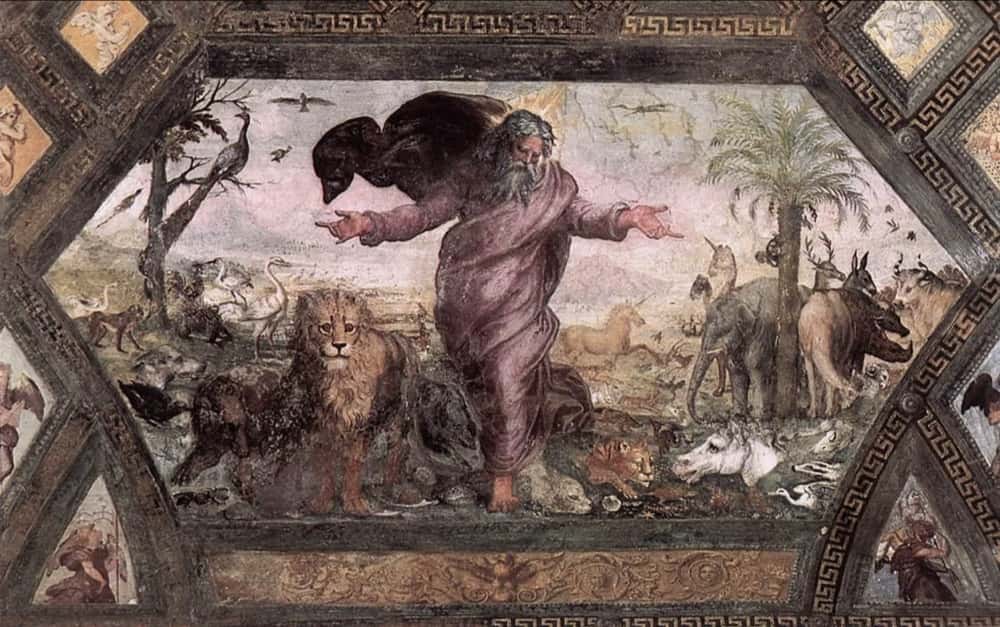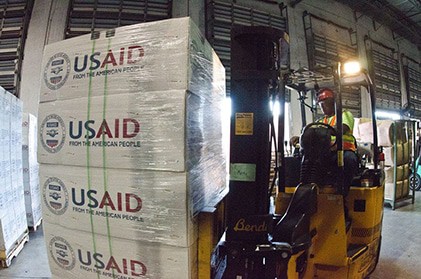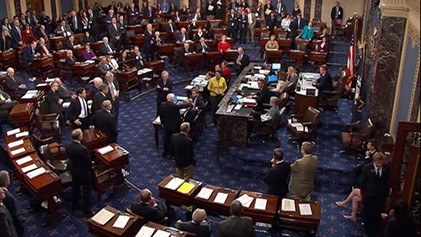Universal Destination of Goods
Must Flow Freely to All
Applies to the Necessities of Life
Is God’s Gift to Humanity
Precedes Private Property Rights
All Rights Must Facilitate
You Are Responsible
“The goods of creation are destined for the entire human race”.
Catechism of the Catholic Church, 2452
What is the Universal Destination of Goods Exactly?
“God gave the earth to the whole human race for the sustenance of all its members, without excluding or favoring anyone.”
Pope St. John Paul II, 31
“This is the Foundation…
of the universal destination of the earth’s goods.” (Pope St. John Paul II, 31)
“Fill the earth and subdue it (Genesis 1:28)…teaches us that the whole of creation is for man”. (Pope St. Paul VI, 22) That “God intended the earth with everything contained in it for the use of all human beings”. (Gaudium et Spes, 69)
“This right applies to both “the necessities of life and the tools for…progress“. (Pope St. Paul VI, 22)

“All other rights…are to be subordinated to this principle”.
Pope St. Paul VI, 22

“In Fact, All Rights…
should actively facilitate its implementation.” (Pope St. Paul VI, 22)
“Under the leadership of justice and in the company of charity, created goods should flow fairly to all.” (Gaudium et Spes, 69)
“If the earth truly was created to provide man with the necessities of life and the tools for his own progress, it follows that every man has the right to glean what he needs from the earth”. (Pope St. Paul VI, 22)
The Common Good “requires respect for the universal destination of goods.” (Catechism of the Catholic Church, 2401)
READ MORE
The Universal Destination of Goods also establishes/confirms rights of the poor:
“If one is in extreme necessity, he has the right to procure for himself what he needs out of the riches of others”. (Gaudium et Spes, 69)
“Concerning the use of material goods, Our Predecessor (Pope Pius XII) declared that the right of every man to use these for his own sustenance is prior to every other economic right, even that of private property.” (Pope St. John XXIII, 43)
Personal Responsibility
If anyone has material possessions and sees a brother or sister in need but has no pity on them, how can the love of God be in that person?
1 John 3:17
You Are Responsible!
“We are all equally responsible…it is necessary to educate one’s conscience to the sense of responsibility which weighs upon each and every one”. (Pope St. John XXIII, 158)
“The Fathers and Doctors of the Church held this opinion, teaching that men are obliged to come to the relief of the poor and to do so not merely out of their superfluous goods.” (Gaudium et Spes, 69)
“Man should regard the external things that he legitimately possesses not only as his own but also as common…able to benefit not only him but also others”. (Gaudium et Spes, 69)
READ MORE
While it is true: “We are all equally responsible” this obligation rests “especially upon those who are more blessed with this world’s goods.” (Pope St. John XXIII, 158)
“Everyone knows that the Fathers of the Church laid down the duty of the rich toward the poor in no uncertain terms.” (Pope St. Paul VI, 23)
“Whoever has received from the divine bounty a large share of temporal blessings, whether they be external and material, or gifts of the mind, has received them for the purpose of using them for the perfecting of his own nature, and, at the same time, that he may employ them, as the steward of God’s providence, for the benefit of others.” (Pope Leo XIII, 22)

State Responsibility
“Redirecting” the rights of property “back to their original purpose must be regarded as an important and urgent social duty.”
Pope St. Paul VI, 22

Only the State Can Ensure This
“In highly developed nations a body of social institutions…can…bring to reality the common destination of earthly goods”. (Gaudium et Spes, 69)
In the international sphere, all “governments” are called “to share and employ their earthly goods, according to the ability of each“. (Gaudium et Spes, 69)
“The economic prosperity of a nation is not so much its total assets in terms of wealth and property, as the equitable division and distribution of this wealth.” (Pope St. John XXIII, 74)
READ MORE
“Where this is secured in a permanent way, a people will be, in a true sense, economically rich” and the Universal Destination of Goods will have been “actuated in conformity with the purpose willed by the Creator.” (Pope Pius XII, Mater et Magistra, 74)
A Word of Warning
“Vigilance is necessary to prevent the citizens from being led into certain inactivity vis-a-vis
society or from rejecting the burden of taking up office or from refusing to serve”.
Gaudium et Spes, 69
Must Not Lead to a Welfare State
The Universal Destination of Goods warns of the dangers of a “welfare state” and its violations of Human Dignity:
Indeed, assistance is best accomplished “by supporting individuals or peoples with the aid by which they may be able to help and develop themselves.” (Gaudium et Spes, 69)
“The national economy…has no other end than to secure without interruption the material conditions in which the individual life of the citizens may fully develop”. (Pope Pius XII, Mater et Magistra, 74)

The Bottom Line
- “It is necessary to state once more the characteristic principle of Christian social doctrine: the goods of this world are originally meant for all.” (Pope St. John Paul II, 42)
- “The goods of the earth are destined for the whole human race”. (Catechism of the Catholic Church, 2402)
- “The goods which were created by God for all men should flow to all alike, according to the principles of justice and charity”. (Pope Pius XII, Mater et Magistra, 43)
What About Private Property?
“The right to private property does not abolish the universal destination of goods.”
Catechism of the Catholic Church, 2452
- “The universal destination of goods is not a figure of speech found in the Church’s social teaching. It is a reality prior to private property.” (Pope Francis, 3.1)
- “Our predecessors have insisted time and again on the social function inherent in the right of private ownership…goods are primarily intended for the worthy support of the entire human race.” (Mater et Magistra, 119)
- Catholic social teaching “has always understood the right to private property within the broader context of the right common to all…the right to private property is subordinated to the right to common use, to the fact that goods are meant for everyone”. (Pope St. John Paul II, 14)
READ MORE
Still, “the promotion of the common good requires respect for the right to private property and its exercise”. (Catechism of the Catholic Church, 2403)
The Universal Destination of Goods requires “respect for the right to private property”. (Pope Francis, 3.1)
“The logic of profit and that of the equal distribution of goods…do not contradict each other if their relationship is well ordered. Catholic social doctrine has always supported that equitable distribution of goods is a priority. Naturally, profit is legitimate and, in just measure, necessary for economic development”. (Pope Benedict XVI)
FAQs
Why does the universal destination of goods supersede all other rights?
“In the very first pages of Scripture we read these words: ‘Fill the earth and subdue it.’ This teaches us that the whole of creation is for man, that he has been charged to give it meaning by his intelligent activity, to complete and perfect it by his own efforts and to his own advantage. Now if the earth truly was created to provide man with the necessities of life and the tools for his own progress, it follows that every man has the right to glean what he needs from the earth. The recent Council reiterated this truth: ‘God intended the earth and everything in it for the use of all human beings and peoples. Thus, under the leadership of justice and in the company of charity, created goods should flow fairly to all.’ All other rights, whatever they may be, including the rights of property and free trade, are to be subordinated to this principle. They should in no way hinder it; in fact, they should actively facilitate its implementation. Redirecting these rights back to their original purpose must be regarded as an important and urgent social duty.” (Pope St. Paul VI, 22)
Do only the wealthy have personal responsibility toward the universal destination of goods?
In a way, yes – as those without goods have little to share: “Everyone knows that the Fathers of the Church laid down the duty of the rich toward the poor in no uncertain terms. As St. Ambrose put it: ‘You are not making a gift of what is yours to the poor man, but you are giving him back what is his. You have been appropriating things that are meant to be for the common use of everyone. The earth belongs to everyone, not to the rich.’” (Pope St. Paul VI, 23)
In a way “no” – since: “We are all equally responsible”. (Pope St. John XXIII, 158)
However, ultimately, this obligation rests “especially upon those who are more blessed with this world’s goods.” (Pope St. John XXIII, 158) And, “The Fathers and Doctors of the Church held this opinion, teaching that men are obliged to come to the relief of the poor and to do so not merely out of their superfluous goods.” (Gaudium et Spes, 69)
Is the Church really saying we can steal from our neighbors?
“Yes”. But — it is not stealing! The Church holds that “If one is in extreme necessity, he has the right to procure for himself what he needs out of the riches of others”. (Gaudium et Spes, 69) This makes it not stealing but, rather, the pursuit of a human right. As Pope St. John XXIII said: “Concerning the use of material goods, Our Predecessor (Pope Pius XII) declared that the right of every man to use these for his own sustenance is prior to every other economic right, even that of private property.” (Mater et Magistra, 43)
However, note: this is justified only in cases of “extreme necessity”. I.e., the furthest limit or highest degree of necessity; necessity going far beyond what is reasonable, moderate, or normal.
Nor should the “rich” object to this since: “Whoever has received from the divine bounty a large share of temporal blessings…has received them…that he may employ them as the steward of God’s providence, for the benefit of others.” (Pope Leo XIII, 22)





